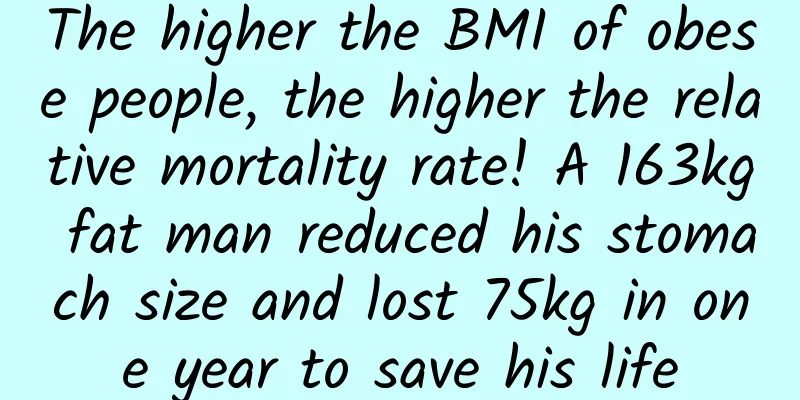Weight loss plateau? Nutritionist: Basal metabolism is the key (Part 1)

|
When you ask someone how they gained weight, you'll find that there are always a few numbers that leave a particularly deep impression on them. Take Miss A's weight history as an example. When she was young and a student, her weight was maintained at 52 kg. After she started working, her weight increased to 56 kg. Later, due to changes in her marriage environment and diet (adapting to her husband's family's eating habits), her weight increased to 58 kg. Then, due to pregnancy and childbirth, her weight soared to 65 kg. I believe that everyone who is reading this article will have such a situation when recalling their own weight history~ There are always a few weight numbers that remain for a long time, which makes us particularly impressed by them. The reason why nutritionists use this example to introduce the topic of weight stagnation is to tell everyone that "life will always find its way". Oh, no, this is a line from Jurassic Park. It should say "weight will always find its way" (weight will eventually remain at a fixed number)! Maintaining weight is the body's instinct: a brief discussion on the phenomenon of constant weight (set point theory)! I wonder if you have noticed one thing: if we don’t deliberately eat less to lose weight or eat too much, our weight will naturally be maintained at a certain number (kilograms). Some people call this the "fixed-point theory" of weight, but in fact it is just a normal physiological phenomenon of the human body. "Survival of the fittest" means that if a species wants to survive, it must be able to adapt to the environment. Some people may wonder why the nutritionist brought up biology again, but our weight changes, such as the example of Ms. A mentioned above, are actually the result of the body constantly adjusting and adapting to the environment (Note). Note: This is true not only for weight, but also for various physiological indices including blood pressure, blood sugar, body temperature, etc. After our bodies adapt to the "new" environment, they will eventually maintain it within a range. This is what is called "homeostasis" in biology. When our weight adapts to the environment, it will naturally stop at a certain kilogram. At this time, you can regard this weight as the result of the body's adaptation to the environment (including diet, lifestyle, habits and other factors). At this time, the body's intake is just equal to the demand, so the weight will remain unchanged. It is the instinct of living things to maintain constancy, so you will find that the naturally maintained weight is quite stable. It will not go down just because you are occasionally busy or skip a meal or two, nor will it make you fat just because of the occasional dinner or social gatherings. Your weight may fluctuate in the short term (one or two days). But without deliberate diet control, it will eventually tend to maintain a certain weight. This is the phenomenon of weight constancy, which some people call the fixed-point theory of weight. Basically, there is not just one weight set point, and the body may have multiple weight set points as the environment changes. Losing weight is an act that goes against the body's instincts: A brief discussion on the phenomenon of weight stagnation! Losing weight is difficult because it goes against the body's instinct (maintaining weight). Therefore, when we "eat less" to lose weight, we will also encounter various physiological adjustments made by the body to offset the lack of energy from eating less: 1. Reduce energy consumption (throttling) Our body needs energy (calories) to carry out various physiological activities, from heartbeat, breathing, maintaining body temperature, to digesting food, thinking, walking, etc. Eating less will cause energy shortage. In order to cope with the reduction in energy, the body will reduce energy expenditure through some adjustment mechanisms. For example, let your heart beat less, breathe less, etc. Therefore, during the weight loss process, you will find that your mental, physical strength or vitality decreases, you will feel lazy and unwilling to move, your brain thinking will become slow, etc. The purpose is to reduce energy consumption in order to maintain a constant weight. 2. Increase energy intake (open source) In addition, you will find that during the weight loss process, your desire for food will increase: you always feel your stomach is empty and you want to eat something, but even if you stuff yourself with a lot of vegetables and drink a lot of water, your body is not satisfied and you always want to eat something sweet or something else. Therefore, you have to spend a lot of effort to restrain this desire to eat. 3. Increase heat absorption (open source) Not only that, you will also find that the body's absorption rate has become very good. Even if you only eat a little food, the calories are easily absorbed. Therefore, the weight will be gained back quickly. This is also an adjustment made by the body to cope with insufficient energy. The above-mentioned physiological reactions, or the many physiological challenges, make it difficult to lose weight and make your weight easily stagnate. If you eat less, you will lose weight at first, but due to the physiological factors mentioned above, the weight loss process is quite difficult. You will face problems such as reduced metabolism and increasing desire for food, making it increasingly difficult to lose weight, and eventually your weight will stagnate. When your weight appears to be stagnant, if you continue to eat less, you may continue to lose weight, but eventually your weight will stagnate when you can no longer eat less. If you give up eating less and return to a normal diet at this time, your weight will quickly go back on due to low metabolism, fast absorption rate and an explosion after excessive suppression, and you may even gain more weight than before. In summary, whether it is to lose weight successfully or to break through the phenomenon of weight stagnation, we need to face these problems and solve them! Know yourself and your enemy, and you will never be defeated: the key to breaking through the phenomenon of weight stagnation! The principle of weight loss is to make the intake less than the consumption. The intake here refers to the calories consumed from food. During the weight loss process, the intake decreases due to eating less, while the consumption (commonly known as metabolism) decreases due to the various physiological adjustments and adaptations made by the body in response to the lack of calories. When the final intake = consumption, the body weight remains unchanged, that is, weight stagnation occurs. Weight loss is caused by a decrease in metabolism. Our body's metabolism is mainly determined by three factors: basal metabolism, physiological activity and the thermal effect of food intake. Unfortunately, during the weight loss process, these three key factors affecting metabolism will decrease, causing the overall metabolism to decline, and eventually weight stagnation will occur. 1. Reduced basal metabolism Basal metabolism accounts for about 70% of metabolism. The so-called basal metabolic rate (BMR) refers to the calories needed by the body to maintain breathing, heartbeat, blood circulation, body temperature, etc. It is mainly determined by active metabolic tissues such as internal organs and muscles. In other words, for every 100 calories we eat, 70 calories are consumed by them. Lean tissues such as muscles and internal organs are the main sources of calorie consumption in the body and are the key to influencing the overall metabolism. Unfortunately, during the weight loss process, as fat is reduced, lean tissue will also be lost, leading to a decrease in basal metabolism. Note: Regardless of how fast or slow you lose weight, if you rely on diet alone, the weight you lose includes both fat and muscle tissue. Studies have shown that only half of the weight lost by eating less is fat, and the other half is muscle. Muscle is the main tissue in the body responsible for metabolism. The loss of lean tissue such as muscle may explain why metabolism decreases as more weight is lost. Encyclopedia: Repeatedly eating less to lose weight will cause your metabolism to drop lower and lower, making it harder to lose weight We naturally lose muscle tissue as we age, which is why older people burn fewer calories (lower metabolism) and are more likely to gain weight as they age. However, the phenomenon that eating less is less effective in losing weight due to low metabolism is not only a problem for the elderly, but also for many young people. It is especially common to hear those who have rich experience in weight loss talk about how they cannot lose weight even if they eat less than the average person. For these people, the reason why their metabolism is so low is because of long-term and repeated weight loss. We just mentioned that each time you lose weight, part of the weight lost is fat and part is lean tissue; but in the process of gaining weight again, all the weight gained back is fat. Therefore, as you lose weight more and more times, the lean tissue content in the body will become lower and lower, and the amount of fat will become higher and higher, so the metabolism will naturally decrease. Therefore, for those people whose metabolism is already very low and who cannot lose weight even if they eat very little, the solution is to adjust their basal metabolism from the root, rather than blindly studying how to eat less, because their metabolism is already too low and the amount they can eat less is limited. 2. Reduced physical activity The calories consumed by physiological activities account for 20% of total metabolism. The calories consumed from daily activities such as walking, writing, talking, moving the body to sports such as running and swimming are all considered physiological activities. As you lose weight, the calories you burn through physical activity also decrease. Many people often curiously ask nutritionists why heavier people consume more calories when doing the same exercise. The logic is very simple. Think about it, if a 100-kg person is compared to a 50-kg person, and they both engage in activities like jogging, who needs to consume more calories, the energy required for the 100-kg person to lift his legs compared to the 50-kg person? Of course it’s a 100 kg person! Therefore, as we lose weight, the calories consumed by physical activities will also decrease. 3. Reduced thermogenic effect of food intake: The thermogenesis effect of food intake accounts for about 10%, which refers to the calories consumed in a series of biochemical processes such as chewing food, digesting and absorbing food when eating. This calorie consumption will decrease accordingly as the amount of food consumed decreases during the weight loss process. Looking at the above, we will find that in the process of weight loss, whether it is basal metabolism, physiological activity or the thermal effect of food intake, they all decrease with the weight loss process, causing the weight to stagnate from time to time. Therefore, if you want to solve the problem of weight stagnation, you must consider these issues when taking weight loss measures. Perhaps we cannot completely avoid this natural physiological phenomenon, but we can definitely use the correct weight loss methods and some techniques to delay the occurrence of weight stagnation and reduce the number of weight stagnation, so that we can achieve the goal of successful weight loss. (to be continued) |
<<: How to lose weight during menopause? Nutritionist: The key is this trick...
Recommend
Eat out to lose weight and avoid the three breakfast landmines
How important is breakfast? Entering the words &q...
Understand the causes of recurrent vulvar leukoplakia
Understand the reasons for the recurrence of vulv...
Can I get adenomyosis if I am not married?
In adenomyosis, iodized oil contrast imaging of t...
What are the symptoms of endometriosis?
Endometriosis is a common gynecological disease i...
Love high-intensity exercise? Be careful or your heart will be broken!
There are four keys to protecting your heart: qui...
Breaking down the key causes of pelvic inflammatory disease
Clinically, many people do not understand the cau...
What are the causes of irregular menstruation?
Irregular menstruation affects women's daily ...
What are the signs of amenorrhea?
What are the symptoms of amenorrhea? Amenorrhea i...
How often do cervical warts recur?
The higher the chance of recurrence of cervical w...
How to relieve menstrual cramps yourself
Most women experience physical discomfort during ...
What is abnormal uterine bleeding after menopause?
As the population ages, the number of women exper...
Causes of ectopic pregnancy in women with fallopian tube dysplasia
As society becomes more and more open, many women...
Can I have a baby if I have Bartholin's glanditis?
Can you get pregnant and have a baby if you have ...
Analyze the causes of vaginal candidal infection
Vaginal candidiasis is a very common type of vagi...
Can the right ovarian cyst be cured after 4 years? What should we pay attention to in life?
Can right ovarian cysts be cured within 4 years? ...









